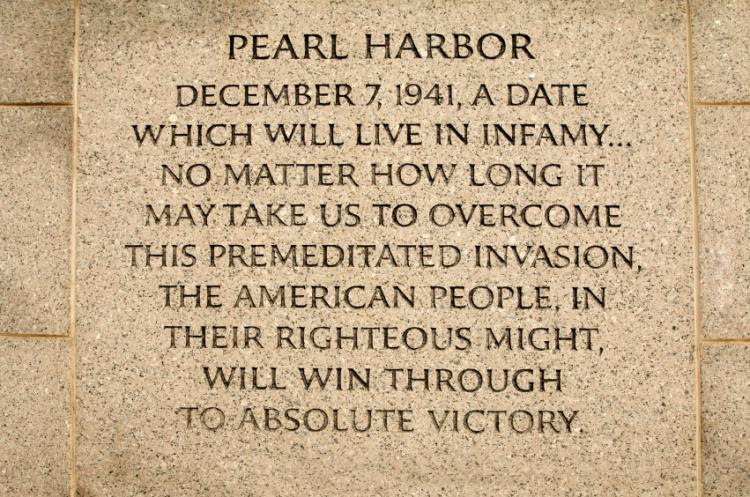National Pearl Harbor Remembrance Day, which is annually on December 7, commemorates the attack on Pearl Harbor, in Hawaii, during World War II. Many American service men and women lost their lives or were injured on December 7, 1941. National Pearl Harbor Remembrance Day is also referred to as Pearl Harbor Remembrance Day or Pearl Harbor Day.
Is Pearl Harbor Remembrance Day a Public Holiday?
Pearl Harbor Remembrance Day is not a public holiday. Businesses have normal opening hours.

Some communities hold special memorial services on Pearl Harbor Remembrance Day.
©iStockphoto.com/JPecha
What Do People Do?
On the direction of the President, the flag of the United States of America should be displayed on the homes of Americans, the White House and all United States government buildings. The flag should be flown at half-mast to honor those who died in the attack on Pearl Harbor.
Many associations, especially those linked with Pearl Harbor survivors or those who died from the attack, participate in special services to commemorate the event. Memorial services are held at venues such as the USS Arizona Memorial in Pearl Harbor. Other activities include: wreath-laying ceremonies; keynote speeches by those associated with the event; luncheons; media stories on survivors’ recollections of the Pearl Harbor attack; and school activities to educate students about the attack on Pearl Harbor in relation to World War II history.
Public Life
Pearl Harbor Remembrance Day is not a federal holiday. Government offices, schools, businesses and other organizations do not close. Public transit systems run on their regular schedules. Some organizations may hold special events in memory of those killed or injured in Pearl Harbor.
Background
On Sunday morning, December 7, 1941, the American Army and Navy base in Pearl Harbor, Hawaii was attacked by the Imperial Japanese Navy. The attack came as a surprise to the American Army and Navy and lead to great losses of life and equipment. More than 2000 American citizens were killed and more than 1000 were injured. The Americans also lost a large proportion of their battle ships and nearly 200 aircraft that were stationed in the Pacific region. More than 60 Japanese servicemen were killed, injured or captured. The Japanese Navy also lost five midget submarines and 29 aircraft.
The Japanese military had hoped that the attack on Pearl Harbor would prevent the United States of America from increasing her influence in the Pacific. However, the events in Pearl Harbor actually led to the escalation of World War II. The day after the attack, the United States declared war on Japan and so entered World War II. President Franklin Roosevelt in a speech to Congress stated that the bombing of Pearl Harbor was "a date which will live in infamy”. Shortly afterwards, Germany also declared war on the United States. In the months that followed the attack, the slogan "Remember Pearl Harbor” swept the United States and radio stations repeatedly played a song of the same name.
In 1991, which marked the 50th anniversary of the attack on Pearl Harbor, the United States Congress established the Pearl Harbor Commemorative Medal. This is also known as the Pearl Harbor Survivor's Medal and can be awarded to any veteran of the United States military who were present in or around Pearl Harbor during the attack by the Japanese military. The medal can be awarded to civilians, who were killed or injured in the attack.
